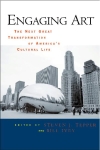« Is it the Art or the Artist? | Main | No just "reviving" art... »
June 15, 2007
The Infinitely Recordable Me
by Douglas McLennanTo Laura: I was with you when you were describing differences between live performances and recordings. But then you had to go and say this:
I would argue that our access to recorded music makes listeners want live performance even more. If a twenty year old has five CD's of their favorite rap star, they are probably going to knock themselves out to attend a live performance if the opportunity arises.
I think that this largely used to be true. But I think for many people the recorded experience might now be preferable to the live one. Live pop for example almost never delivers in purely musical terms. The sound isn't mixed well, the crowd is noisy, and the acoustics are terrible. I suspect the attraction of these events has more to do with having an encounter with someone famous or plugging in to the energy of a crowd than it does an appreciation of the music. Not to say that isn't important, but it's very different. Watching sports on TV is also a different experience. With replays, multiple camera angles and constant stats and analysis on the screen, one can participate in a deeper way in the pure game.
Except you can't. You might know more about what's going on in the game. You might be able to hear the layers of the music better in a recording, but I think most people would identify an essential "being there" experience that generally trumps the comfort of your own living room.
Okay - I realize I've just argued against my initial point. But perhaps not. I think the recorded experience - one which we increasingly have more control of (think Tivo, iPods, etc) - is increasingly different from the live experience, and speaks to entirely to different needs. No more is the recorded experience a shadow of the live version; it offers different things, speaks to different needs. Most people's encounters with artists these days comes not from a live experience, but through a screen or speaker. Even if you're a big music fan, your bulk relationship with music is through recording. Live has largely become the boutique experience.
I have a friend who's an audiophile. For him the sound is everything, and witnessing his fanaticism about the minute placement of expensive speakers and super special wiring sometimes makes me question what he really finds important in music. At the other end, I know music critics who seem to be quite content listening to music in crappy MP3 files on lousy equipment. For them, the sound is not so relevant as the ideas or artistry expressed in those ideas. Sound be damned.
We live in a visual age. One of the things that has happened with computers and video in recent years is that the sophistication of our video language has moved away from the visual language that can be employed in real life on a stage. If our primary visual language is now that of the screen, and live linear story-telling is increasingly a foreign language (the theatre audience is much smaller than the TV or movie audience), how do you hook people on the live experience when they have less and less encounter with it and may no longer find the language familiar?
I can buy an argument that the live musical experience is about participation and being involved. But if that kind of involving experience is increasingly a foreign experience for someone who's used to using recorded music to accompany their day, how do you convince them that it's important? Their experience of music in the recorded world might not require them to have the live experience to be a music fan.
Posted by mclennan at June 15, 2007 8:14 AM
COMMENTS
Post a comment
Tell A Friend
Resources
Engaging Art: The Next Great Transformation of America's Cultural Life Chapter downloads MP3s Vanessa Bertozzi on audiences and participation Vanessa Bertozzi on involving artists in work Steven Tepper argues the historical context of arts in America
Abstracts
Chapter 4
In & Out of the Dark - (a theory about audience behavior from Sophocles to spoken word)
Chapter 7
Artistic Expression in the age of Participatory Culture (How and Why Young People Create)
Chapter 8
Music, Mavens & Technology
(all chapters in pdf form)
Steven Tepper talks about technology and the future of cultural choice
Lynne Conner on the historical relationship between artist and audience
Lynne Conner on event and meaning and sports
AJ Blogs
AJBlogCentral | rss
culture
Terry Teachout on the arts in New York City
Andrew Taylor on the business of arts & culture
rock culture approximately
Rebuilding Gulf Culture after Katrina
Douglas McLennan's blog
Art from the American Outback
Scott McLemee on books, ideas & trash-culture ephemera
Jan Herman - arts, media & culture with 'tude
dance
Apollinaire Scherr talks about dance
Tobi Tobias on dance et al...
media
Jeff Weinstein's Cultural Mixology
Martha Bayles on Film...
music
Greg Sandow performs a book-in-progress
Howard Mandel's freelance Urban Improvisation
Focus on New Orleans. Jazz and Other Sounds
Exploring Orchestras w/ Henry Fogel
Kyle Gann on music after the fact
Doug Ramsey on Jazz and other matters...
Greg Sandow on the future of Classical Music
Norman Lebrecht on Shifting Sound Worlds
publishing
Jerome Weeks on Books
visual
Public Art, Public Space
John Perreault's art diary
Lee Rosenbaum's Cultural Commentary
Tyler Green's modern & contemporary art blog
Special AJ Blogs
June 14-20, 2007



